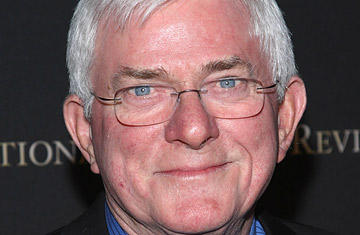
Phil Donahue
Long-time talk show host Phil Donahue wants America to take a long look at what the Iraq War is doing to its young men and women. Body of War, which Donahue produced and co-directed with Ellen Spiro, and which airs tonight on the Sundance Channel in honor of Veterans Day, tells the story of Tomas Young, a formerly gung-ho soldier who was paralyzed after less than a week in Iraq. Donahue spoke with TIME about getting kicked off MSNBC, why Iraq war movies are not a draw, and the death of the word "liberal."
This is a pretty angry movie. Is outrage a valuable tool for a documentary filmmaker?
Sure. Why not? If one's sense of humor can be the source of a documentary, why couldn't one's sense of outrage? I don't think it's so much what motivates you, but rather the final product that's the important thing.
How did you come across the story of Tomas Young?
I was invited to visit Walter Reed [Army Medical Center] by Ralph Nader. I had been on the Nader bus in 2000. And after the 2004 election, Nader said, "A mother at Walter Reed has asked to see me. Do you wanna go?" I said yes immediately. I'd never been to America's most famous military hospital, so off we went. And here is this young man. 24 years old. Very thin. His cheekbones stuck out. He was totally whacked out on morphine. And his mother explained his injury to me. He was in Sadr City, in an uncovered truck, when a bullet entered his shoulder from above. How it didn't hit a major artery, I'll never know. And now Tomas is paralyzed from the nipples down. Tomas can't walk. Tomas can't cough. Tomas throws up every morning.
You get a sense of the domino effect here. You put a bullet through a man's spine, all kinds of things happen. Tomas has bowel and bladder issues. Tomas has erectile dysfunction—28 years old, in the prime of his life. What we're saying with this film is that what you see with Tomas is a drama taking place behind the closed doors of thousands of homes in this country. Thousands. We're trying to show the reality of this war, which is the most sanitized war in our lifetime.
Why don't Iraq War movies do very well at theaters?
Iraq War documentaries play to empty seats. It's a tough, tough sell. I'm a big boy, and I know this business will break my heart. We got named to the shortlist for the Oscar, but we could not find a distributor for our film. Everybody walked away from it. Then we were able to arrange a deal with Landmark Theaters, where they agreed to roll it out. Ellen [Spiro] and I would do a Q&A opening night, and the place would be jampacked. It was glorious. And the next day there'd be seven people in the theater. This is not a "take your girl to the movies" movie. But you can hardly criticize a theater owner for not wanting to show a movie that plays to empty seats.
Did you learn anything from working on this film about the way veterans are treated in America?
I learned a lot about America's pretense. "Oh the troops, the troops, the brave troops, the precious troops, the courageous troops!" We deify these troops. And then when they come home, the VA doesn't call them back. That's just one of the great pretenses. Another is, "Democracy, democracy, you have to have democracy!" Hell, less than half of us vote. Until last week, that is.
What would you change about the way veterans are treated here?
A lot of what ails the VA is similar to what troubles health care in America today. Too many pills thrown at too many soldiers. They're often just palliatives. Spoons full of sugar that aren't really advancing the recovery of the soldier. Paraplegics, especially, aren't getting the finely tuned physical therapy they need. This is time-consuming and labor-intensive. Physical therapy involves a real-life person being with you for at least a half hour, pushing and pulling, getting the arms up in the air, doing everything that the paraplegic cannot.
Look, there are a lot of hard-working people at VA hospitals, but we cannot turn our backs to the reality that the system is broken. It's totally ill prepared to accept the kind of volume that has come to them as a result of these occupations in Iraq and Afghanistan.
Has it gotten more acceptable to be anti-war on television now? You were famously kicked off of MSNBC for your opposition to the Iraq war.
Absolutely. That's obvious. Just look at Keith Olbermann. They are now targeting the audience that I figured I might be able to get. I thought people would watch me because I was different. Silly goose. We turned out to be a big embarrassment to MSNBC. In October 2002, if you were a board member of General Electric, you didn't want a retired, gray-haired talk show host popping off against this war or this president. It wasn't good for business. If you were against the war, you risked being called liberal. And if your cable channel was called liberal, you panicked.
"Liberal" is the kiss of death. In the land of the free, we have silenced half the political voice of this country. They've got us afraid to even use the world liberal. We call ourselves "progressive" now. We've allowed them to take our name away!
Is that a forever thing? Will the word liberal ever not be a bad word?
I wish I was smart enough to know. It's scary. I don't know how you turn that around.
